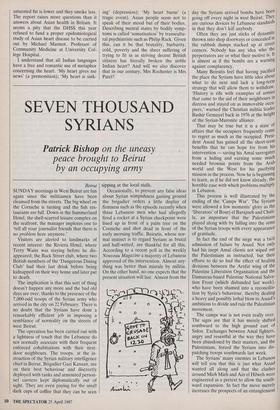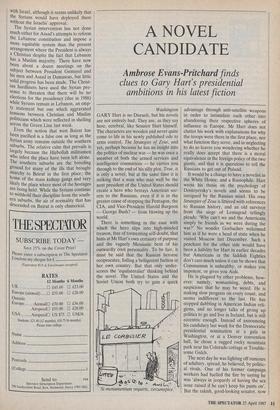SEVEN THOUSAND SYRIANS
Patrick Bishop on the uneasy
peace brought to Beirut by an occupying army
Beirut SUNDAY mornings in West Beirut are fun again since the militiamen have been cleansed from the streets. The big wheel on the Corniche is turning and the fish res- taurants are full. Down in the Summerland Hotel, the shell-scarred leisure complex on the seafront, the manager implores one to `tell all your journalist friends that there is no problem here anymore.'
Visitors are alerted to landmarks of recent interest: the Riviera Hotel, where Terry Waite was staying before he dis- appeared; the Back Street club, where two British members of the 'Dangerous Dining Club' had their last drink before being kidnapped on their way home and later put to death.
The implication is that this sort of thing doesn't happen any more and the bad old days are over, thanks to the presence of the 7,000-odd troops of the Syrian army who arrived in the city on 22 February. There is no doubt that the Syrians have done a remarkably efficient job in imposing a semblance of normality on the streets of west Beirut.
The operation has been carried out with a lightness of touch that the Lebanese do not normally associate with their frequent enforced cohabitations with their next- door neighbours. The troops, at the in- struction of the Syrian military intelligence chief in Beirut, Brigadier Gazi Kanaan, are on their best behaviour and discreetly deployed with tanks and armoured person- nel carriers kept diplomatically out of sight. They are even paying for the small dark cups of coffee that they can be seen sipping at the local stalls.
Occasionally, to prevent any false ideas about Syrian wimpishness gaining ground the brigadier orders a little display of firmness such as the episode recently when three Lebanese men who had allegedly fired a rocket at a Syrian checkpoint were lined up in front of a palm tree on the Corniche and shot dead in front of the early morning traffic. Beirutis, whose nor- mal instinct is to regard Syrians as brutal and half-witted, are thankful for all this. According to a recent poll in the weekly Nouveau Magazine a majority of Lebanese approved of the, intervention. Almost any- thing was better than misrule by militia. On the other hand, no one expects that the present situation will last. Almost from the day the Syrians arrived bombs have been going off every night in west Beirut. They are curious devices by Lebanese standards in that they don't kill anybody. Often they are just sticks of dynamite thrown into shop doorways or concealed in the rubbish dumps stacked up at street corners. Nobody has any idea who the perpetrators are or what their motive is. It is almost as if the bombs are a warning against complacency. Many Beirutis feel that having pacified the place the Syrians have little idea about what to do next and lack a long-term strategy that will allow them to withdraw. `History is rife with examples of armies that came to the aid of their neighbours in distress and stayed on as immovable occu- piers,' warned the Christian militia leader Bashir Gemayel back in 1976 at the height of the Syrian-Maronite alliance. That may be true but it is a state of affairs that the occupiers frequently come to regret as much as the occupied. Presi- dent Assad has gained all the short-term benefits that he can hope for from his intervention — saving his Amal surrogates from a hiding and earning some much needed brownie points from the Arab world and the West for his pacifying mission in the process. Now he is beginning to learn, as if he did not know already, the horrible ease with which problems multiply in Lebanon.
This process is well illustrated by the ending of the 'Camps War'. The Syrians were allowed a few moments' glory as the `liberators' of Bourj el Barajneh and Chati- la, an imposture that the Palestinians played along with by falling into the anus of the Syrian troops with every appearance of gratitude. In fact the end of the siege was a tacit admission of failure by Assad. Not only had his inept Amal clients not wiped out the Palestinians as instructed, but their efforts to do so had the effect of healing divisions between the Arafat wing of the Palestine Liberation Organisation and the Damascus-based Palestine National Salva- tion Front (which disbanded last week), who have been shamed into a reconcilia- tion by Syria's behaviour, thereby dealing a heavy and possibly lethal blow to Assad's ambitions to divide and rule the Palestinian movement.
The camps war is not even really over. The signs are that it has merely shifted southward to the high ground east of Sidon. Exchanges between Amal fighters, angry and resentful at the way they have been abandoned by their masters, and the Palestinians, forced the Syrians into dis- patching troops southwards last week.
The Syrians' many enemies in Lebanon will tell you that this is just what Assad wanted all along and that the clashes around Mieh Mieh and Ain el Hilweh were engineered as a pretext to allow the south- ward expansion. In fact the move merely increases the prospects of an entanglement with Israel, although it seems unlikely that the Syrians would have deployed there without the Israelis' approval. The Syrian intervention has not done much either for Assad's attempts to reform the Lebanese constitution and impose a more equitable system than the present arrangement where the President is always a Christian despite the fact that Lebanon has a Muslim majority. There have now been about a dozen meetings on the subject between President Gemayel and his men and Assad in Damascus, but little solid progress has been made. The Christ- ian hardliners have used the Syrian pre- sence to threaten that there will be no elections for the presidency (due in 1988) while Syrians remain in Lebanon, an emp- ty statement but one which aggravated tensions between Christian and Muslim politicians which were reflected in shelling across the Green Line last week.
Even the notion that west Beirut has been pacified is a false one as long as the Syrian army remains outside the southern suburbs. The relative calm that prevails is largely because the Hizbollah militiamen who infest the place have been left alone. The southern suburbs are the breeding ground for many of the ills that brought anarchy to Beirut in the first place; the home of the main kidnap gangs and very likely the place where most of the hostages are being held. While the Syrians continue to withhold their discipline from the south- ern suburbs, the air of normality that has descended on Beirut is only chimerical.



































































 Previous page
Previous page